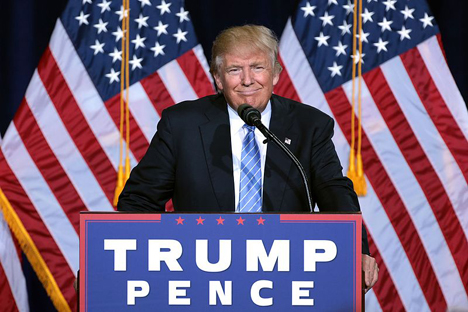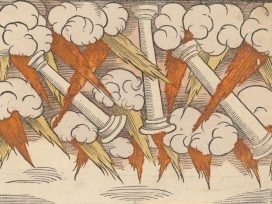In a wide-ranging New York Times interview about foreign policy in July of this year, Donald Trump broke new ideological ground for a Republican presidential nominee:
David Sanger: If Russia came over the border into Estonia or Latvia, Lithuania, places that Americans don’t think about all that often, would you come to their immediate military aid?
Donald Trump: I don’t want to tell you what I’d do because I don’t want Putin to know what I’d do. I have a serious chance of becoming president and I’m not like Obama, that every time they send some troops into Iraq or anyplace else, he has a news conference to announce it.
Sanger: They are NATO members, and we are treaty-obligated…
Trump: We have many NATO members that aren’t paying their bills.
Sanger: That’s true, but we are treaty-obligated under NATO, forget the bills part.
Trump: You can’t forget the bills. They have an obligation to make payments. Many NATO nations are not making payments, are not making what they’re supposed to make. That’s a big thing. You can’t say forget that.
Sanger: Can the members of NATO, including the new members in the Baltics, count on the United States to come to their military aid if they were attacked by Russia? And count on us fulfilling our obligations…
Trump: Have they fulfilled their obligations to us? If they fulfil their obligations to us, the answer is yes.
If Trump’s quid pro quo view of military alliances resembles something of a mafia don directing a protection racket, it didn’t deter him from bringing it up repeatedly in his bid to become the 45th President of the United States. In Trump’s universe, no leverage is too sacred not to use. Harping about NATO allies’ meagre contributions has a long history in American politics; president Obama made a similar complaint in April, saying, “Free riders aggravate me.” Trump, however, has taken this common concern and, in typical fashion, pushed it into radically new rhetorical territory.

Donald Trump speaking at an immigration policy speech in Phoenix, Arizona, 31 August 2016. Photo: Gage Skidmore. Source:Wikimedia
Americans have never been completely comfortable with their Great Power status. When the United States acquired the Philippines after the Spanish-American War, presidential candidate William Jennings Bryan preached to an Indianapolis crowd on the incompatibility of imperialism with American values. In both World War I and World War II, the United States attempted to maintain its neutrality much longer than their eventual allies would have preferred, and in the interwar period the view that WWI had been a mistake was held by a large majority of the American population. At the end of World War II, as Soviet friendship in the fight against the Nazis shifted into Cold War opposition, a return to American isolationism became virtually impossible. A few still tried, though. Ironically, given Republicans’ uniquely high view of NATO among other transnational organizations, it was a Republican Senator who led the isolationist opposition to the NATO treaty in 1949. However, since Senator Robert A. Taft’s doomed campaign against the alliance, no prominent Republican has seriously called into question NATO or stipulated conditions beyond those already existing in the treaty. That is, no Republican until now.
In both style and substance, Donald Trump has strayed well beyond the boundaries that usually delimit Republican foreign policy and action. At times, he has broken the bi-partisan consensus on internationalism with isolationist-sounding remarks about putting America first, about making American allies pay their own way, and about being a neutral arbiter in the Israel-Palestine conflict. But he has also disavowed the term “isolationist” and echoed typically hawkish Republican talking points about Obama’s “apology tour”, the need for a strong military, the utter uselessness of the UN, and the cowardice of the Iran nuclear deal. On the Israel-Palestine conflict, he has gone further than any previous presidential candidate by promising to move the American embassy from Tel Aviv to Jerusalem and by not making the end of Israeli settlements a precondition for peace talks. And then at other moments, he has proudly asserted his opposition to the Iraq War, declaimed regime change, and denounced nation-building, the fundamental building blocks of Bush’s foreign policy.
Despite the mercurial nature of Donald Trump’s pronouncements on foreign policy, there is one clear and incontrovertible difference between Trump’s views and those of the previous Republican administration. Unlike George W. Bush, Trump does not believe that America has a sacred mission to end tyranny throughout the globe. Where Bush echoed Woodrow Wilson about bringing democracy to the world, Trump echoes a mafia boss keeping the other families in line. Where Bush harnessed American fear and uncertainty following the attacks on 9/11 and sublimated them into a Global War on Terror, Trump seeks a way to scrimp money from American allies. This change in tone has not gone unremarked within the Republican coalition. Erstwhile Bush supporters, like neo-conservative Robert Kagan, fled to Clinton’s camp. Other #NeverTrump neo-conservatives, such as Bill Kristol and Norman Podhoretz, instead led a quixotic quest for the “true conservative” candidate. After first putting forth an unknown lawyer and blogger named David French, they finally settled on Evan McMullin, a former CIA agent and Goldman Sachs banker.
In an interview with the New York Times in March, Donald Trump articulated one of the foreign policy principles that distinguished him from his predecessors of both parties:
We’re a debtor nation. We can’t be a debtor nation. I don’t want to be a debtor nation. I want it to be the other way. One of the reasons we’re a debtor nation, we spend so much on the military, but the military isn’t for us. The military is to be policeman for other countries. And to watch over other countries. And there comes a point that, and many of these countries are tremendously rich countries. Not powerful countries, but – in some cases they are powerful – but rich countries.
Trump is not a pacifist who values peace as an ultimate value. Nor is he a leftist rebuking America for its imperial tendencies. Broader questions of war and peace, cultural norms, precedents, and international stability have little concern for the real estate mogul. Trump speaks not of values, but of interests – American interests. And those interests represent a zero-sum game where financial questions are paramount. His interests-based realism centres around the figure of the good negotiator. A good negotiator, unlike, say John Kerry with the Iranians, must be willing to keep all options on the table (like a nuclear attack), but he must also be willing, at any given moment, to walk away from that table. Otherwise, the enemy will smell weakness and end up with the better deal. In order to give himself an upper hand in foreign conflicts, Trump has repeatedly declared that his primary tactic would be unpredictability: telegraphing one’s plans to the enemy is the first step in a bad negotiation. And bad negotiation leads to losing. Losing is not winning. And winning is what America used to do before it lost its greatness. A convenient result of this principle is that articulating a strategy for dealing with foreign policy problems like ISIS is rendered totally unnecessary. On the campaign trail, Trump asserted time and again that “nobody… nobody would be tougher on ISIS.” This is Trump’s foreign policy. It is the extension of a real estate mogul’s negotiating skills to global conflicts over trade and defence. Trump’s foreign policy, in short, is the Art of the Deal writ large.
Precedents
Donald Trump’s approach to foreign policy is hardly unique. Many commentators have noticed the striking parallels between George Wallace’s 1968 third-party campaign for President and Donald Trump’s campaign this year. Like Trump, Wallace drew his support from the disaffected. If Trump’s supporters are motivated by the effects of mass immigration, trade deals, Obamacare, and Black Lives Matter, Wallace’s voters were disturbed by the counterculture, the increase in crime, and, most notably, the Civil Rights Movement. Over the course of the 1960s, in a series of Supreme Court cases, Congressional bills, and Constitutional Amendments, the Jim Crow edifice of segregation and discrimination came crumbling down. Southern whites, who composed the “Solid South” Democratic voting bloc for almost a century, watched the racially hierarchical world they had always known rapidly disintegrate, in no small part because of the actions of one of their own, a Democratic President from the South. Incensed, they turned to the former Governor of Alabama in the 1968 election. Wallace was known for his proclamation, “Segregation now, segregation tomorrow, and segregation forever!” and for his much-publicized stand in front of a white schoolhouse door to prevent a black girl from entering. In the 1968 election, these voters gave Wallace five states and 46 electoral votes, and thereafter they shifted into the Republican camp, where they have remained ever since.
Domestic policy motivated Wallace supporters, but the 1968 election was dominated by the Vietnam War on the foreign policy front. Wallace’s voters, like Trump’s today, were nationalists who were proud of the military and dismissive of hippies. So it was widely assumed that Wallace was a hawk. Journalist Pete Hamill, who was following the Wallace campaign for Ramparts Magazine, recounted how Wallace put this misperception to rest in his campaign speeches:
To visitors freshly arrived, his views on Viet-Nam seem surprising; the popular image of Wallace, at least in the east, would lead one to believe that he is a Super-Hawk who is fully prepared to unload the hydrogen bomb on the yellow vermin of Southeast Asia. But he actually says something quite different.
“Now about Viet-Nam,” he says, “I don’t think we should have gone in there alone in the first place. We should have gone to our Western European allies and the noncommunist nations of Southeast Asia, and if we decided to go in there at all, we should have told them we would not carry the military and economic burden alone. That they would have to share equally, and if they were still not interested, I would cut off every dime of foreign aid and make them pay back every cent they owe us datin’ back to World War One. [Big Applause] So I would go to the Joint Chiefs of Staff, and I would ask them, ‘Can we win this war with conventional weapons?’ And if they said yes, I would make full use of this country’s conventional weapons to quickly end this war and bring our boys home.” This always brings a roar from the crowd. Wallace never says what he would do if the Joint Chiefs told him the war was not winnable with conventional weapons. Some of his aides say that he would pull out “and the hell with it”.
This is Trump’s foreign policy discourse to a “T”: the criticism of the government’s decision to go to war, a call for arm-bending negotiations, and a vague plan to quickly end the war. To end the war, Wallace suggests both a military blitz and a rapid withdrawal. Like Trump’s foreign policy rhetoric, it is paradoxically bellicose and pacifist. But for Wallace, there was no paradox. For him, there was a common thread running from domestic issues like Civil Rights through to foreign issues like the Vietnam War. In a speech to a crowd of more than 15,000 at Madison Square Garden on October 24, 1968, Wallace intoned:
Yes, the liberals and left-wingers in both parties have brought us to the domestic mess we are in also to the foreign policy mess we find our nation involved in at the present time, personified by the no-win war in Southeast Asia.
For Wallace, all of the problems of the day – including the war – had the same root cause: “pointy-headed” liberal elites, spanning both parties, who thought they knew best. This, in its essence, is populism: a defence of the common man’s instincts against the bipartisan incompetence of the elites and the changes their policies have wrought. Populist foreign policy is but an extension of the same critique motivated by the same anger.
Populism and foreign policy
The use of the word “populist” derives from a short-lived political party at the end of the 19th century. At that time, the Republican Party represented northern business and industry, and the Democratic Party was dominated by a traditionally liberal laissez-faire and anti-temperance group known as the Bourbon Democrats. The United States was on the gold standard, which western and southern farmers resented as an unfair prop for bankers and industry back East. A movement of these farmers coalesced into the Populist Party, which in 1896 nominated William Jennings Bryan for President. A pacifist, Prohibitionist, and devout Presbyterian from the midwestern state of Illinois, Bryan went on to become a Congressman from Nebraska, a three-time candidate for President, and Secretary of State under Woodrow Wilson. Thanks to the 1960 film Inherit the Wind, in which he was played by Spencer Tracy, Bryan is perhaps best known as the prosecutor in the 1925 Scopes Trial of a teacher who illegally taught evolution in public school.
In 1896, thanks to widespread economic struggles in the wake of the Panic of 1893, Bryan managed to manoeuver his way past the Bourbon Democrats to the Democratic nomination for President, to which he added the Populist Party and the Silver Republican party. Bryan’s campaign, typified by his famous “Cross of Gold” convention speech, was dominated by domestic issues such as the call for a bimetallic standard to help poor farmers. Like Wallace and Trump after him, Bryan represented those who felt dispossessed and disenfranchised by the elites. And like Wallace and Trump, Bryan was disparaged by most of the media. Despite running at the head of the Democratic ticket, Bryan was shut out of Democratic newspapers, the traditional method of reaching voters at that time. In order to reach voters in this election, Trump pioneered use of Twitter and developed an all-press-is-good-press media strategy that thrives off of free media coverage following provocative comments. In 1896, Bryan’s innovation was to criss-cross the country by train, giving several stump speeches a day. Today we take this type of campaigning for granted, but in that day, candidates mostly stayed home.
Foreign policy barely registered in the 1896 election, which Bryan lost to William McKinley. Two years later, however, the United States was sucked into the Spanish-American war. Bryan enlisted in the war, but came down with typhoid fever and never saw action. Still, he defended the treaty of Paris, which gave Cuba, Puerto Rico, Guam, and the Philippines to the United States if only because, in his view, the United States would be more likely to give independence to the Philippines than Spain would.
Bryan’s reputation for contradictory foreign policy positions became such an issue that he felt it necessary to address the issue in 1900 when he ran for President the second time. It was in this context that Bryan gave his “Against Imperialism” speech in Indianapolis. He justified his support for the war effort and the peace treaty, but he also argued forcefully against American colonization of the Philippines, marshalling theological, pragmatic, and even racial arguments. If, even among populist candidates, theological and racial arguments of the 19th century have largely disappeared from American foreign policy discourse, the pragmatic concerns of empire (or worldwide hegemony) remain: continued military engagement is a waste of resources that could better be spent back home. George Wallace and Donald Trump’s candidacies both occurred in a context where American dominance among the Great Powers is assured. Both candidacies demonstrated a remarkable ambivalence about that power. They asked: has the establishment and exercise of American hegemony actually benefitted the American people? There answer of course is “no”: the same elites resented for domestic reasons have also designed the foreign policy. No further analysis is necessary.
The seemingly contradictory foreign policy positions of each of these anti-establishment presidential candidates – William Jennings Bryan, George Wallace, and Donald Trump – flow from their populist appeals. Each candidate harnessed a group of disenchanted voters. Those voters’ grievances – real and perceived – coalesced into a rebellion against the elites. For populists, domestic policy problems have concrete causes and simplistic solutions. When it comes to foreign policy, though, the target of that anger becomes fuzzier. The issues of foreign policy exist beyond the everyday domestic concerns – economic and political – that propel these political campaigns. So while the foreign policy views of anti-elitist insurgents like Bryan, Wallace, and Trump tend towards isolationism, they are also erratic and inconsistent. A strong figure, often verging on authoritarian, is required to redirect the nation and firmly show the elites the error of their way. This authoritarian bent lends itself to talk of strong shows of power abroad. But the domestic political concerns that propel these populist movements also produce a desire to wind down foreign engagements in order to invest time and money at home. When the wisdom of the common people over elites is assumed and when their anger at those elites provides a political campaign’s primal source, a clear and consistent approach to faraway lands will not be forthcoming.
Foreign policy as deal-making
On August 15, Donald Trump gave a foreign policy speech in Youngstown, Ohio. It was the fullest articulation of his foreign policy philosophy to date. In a playful nod to his campaign slogan, the event was entitled “Make America Safe Again”. For the first time, he laid out a broader historical narrative of America’s path in the world. In the 20th Century, the United States defeated Fascism, Nazism, and Communism. Now, a different threat challenges our world: Radical Islamic Terrorism:
We will defeat Radical Islamic Terrorism, just as we have defeated every threat we have faced in every age before. But we will not defeat it with closed eyes, or silenced voices. Anyone who cannot name our enemy, is not fit to lead this country. Anyone who cannot condemn the hatred, oppression and violence of Radical Islam lacks the moral clarity to serve as our president.
Trump’s simplistic narrative is, of course, riddled with holes. But this is a story we have heard before, and not just from populist candidates. It is the triumphant story American elites tell the American people about the American nation. If Trump thinks that America is no longer great, then why is he peddling the same story as the much-hated elites?
The short answer is that Trump is a negotiator who wants to be a winner. He is not a man of principle. Trump needed to rally his fellow Republicans for the general election, and most Republicans are proud nationalists who believe in American military greatness. The Manichean view that America alone represents goodness and possesses the will, power, and virtue to overcome evil like Nazism, Fascism, and Communism, is so deeply woven in the American fabric now that it one political campaign cannot unravel it. Robert Taft’s lonely opposition to NATO, which rested on a principle no longer shared by most Americans, earned him a spot in his rival John F. Kennedy’s “Profiles in Courage.” Donald Trump possesses no such principle and no such courage.
In his second Inaugural Address in 2005, George W. Bush explained the overarching goal of increasingly numerous American engagements under the headline “War on Terror”: to bring liberty and democracy to all. Trump has stripped off the Wilsonian utopianism and rebranded the Global War on Terror as a war against Radical Islamic Terrorism. Rather than putting the grandiose final touches on the end of history, America is merely engaged in another mortal struggle with the next in a line of evil opponents. Deal-making always occurs in history. Negotiations never end. In Trump’s view, he is merely giving America a better negotiating position in a round that has gone very poorly. And in order to expand his support beyond his populist base, Trump has attempted to unite this zero-sum financial interests-based foreign policy with a potent strand of American belief that crosses the political spectrum: America vanquishes powerful foes.







